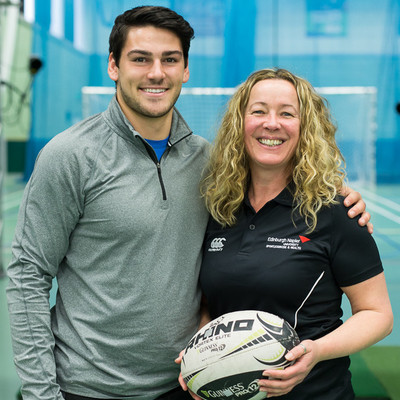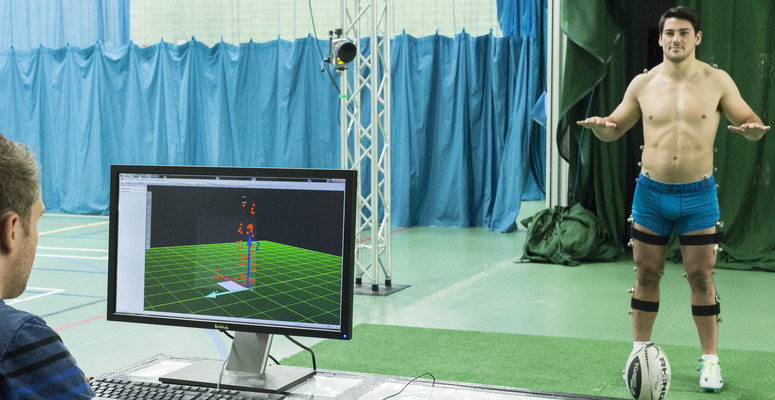What made you consider getting 1-to-1 consultancy?
Susan told me my kicking was terrible (laughing). No, Susan just said she thinks she could help improve my kicking.

How did you meet Susan?
Through the sponsorship between Edinburgh Napier and Edinburgh Rugby.
Had you ever thought about consultancy before?
Probably not. I had known about it, I’d spoken to Chris Paterson about it before and I did a thing here with Andrew Easson a couple of years ago in the lab, so I knew there was a facility there, so it was just a case of approaching Susan and getting some help.
And what made you hesitate, did you think maybe it wouldn’t change your game that much?
No, at the time I was probably kicking reasonably well so I thought my technique was quite good at that time. But then I realised I needed the extra 1% to be the best I can – the marginal gains, I needed to do something that keeps me above the 90% accuracy bracket of kicking.
How do you think the 1-to-1 focus and advice has influenced your wider training?
Certainly when I’m kicking I keep it in mind. I think a lot of professional athletes do a lot of things without noticing exactly what they’re doing. They don’t break things down, it just comes naturally to them. So when Susan gets me to really think about a certain thing I didn’t even know I was doing, to be able to break that down and actually learn exactly what I’m doing was helpful. It makes me focus on how I can improve each little bit.
Before you got involved with Susan, did you perhaps not realise how helpful consultancy could be?
To be honest I didn’t really know how to get it. I would have quite liked to get it if it was there, I just didn’t really know how to get it and what it really entailed or involved.
Has it given you more confidence in your game? I know it’s quite early on.
It’s still early on so it’s still trying to change quite a lot of minor things - for me to be able to adapt what I’ve done for years is quite difficult so it’s going to take some time. But every day or every second day I’m training on it, so it’s a case of keeping repetition, trying to ingrain it and basically teach my body how to do things in a different way.
Relearning habits?
Yes, and it’s quite tough but I think I’m slowly getting there. Every session I seem to be moving just a wee bit forward which helps.
Tiny tweaks?
Yes marginal gains.
It sounds like it can be quite frustrating in a way.
Yes it can be frustrating, especially when you’re so used to something working so well. So if I’m kicking with almost 90% accuracy and it’s going so well for me, then to change something and drop your kicking percentage, even if it's just in training for example (I’m not doing it in games yet), it’s quite difficult to be able to trust something that’s not working for you yet. It's tough to have that perseverance to be able to do it and to know it might go up just by 1 or 2%, which will ultimately help me.
So it’s kind of taking that risk?
Yes it’s taking a massive risk, but it’s obviously having the belief in Susan and trusting myself and my body and my technique to be able to do it.
What are you finding most valuable?
Basically just getting the help from Susan, she’s incredible at what she does so having that advice and that guidance from her, which I know most people don’t get, is really valuable to me. I think to be able to take that back to Edinburgh Rugby and even to compare that to other players and to be able to help them as well is good.
And does it help when you’re in the lab so you can playback your technique and actually see what you’re doing?
It does, especially with the markers. They’re good because you can actually see every single angle. On your own you can film yourself on the pitch and slow it down and see what you’re doing, but you can never really get that full view right through the body or the benefit of being able to spin it round on the camera and actually see how your movements are from behind, as well as the percentage on the force plates. Being able to have that access to that equipment and being able to use that information all at once, to tweak things to what’s going to help me, is really helpful.

Does really getting down into the detail give you more belief so you can really see that this is where I need to change things?
I think it helps you understand what you’re doing wrong. I think you can feel a lot of things and wonder why things aren’t working but you don’t have an answer, and I think it helps you get to that answer. It gives you that confidence to be able to adapt. Then when you go back in the lab and reassess it, and you’ve managed to make that shift and improve it’s really helpful that you’re seeing the gains out of it.
What would you say to another athlete who might be considering consultancy but isn’t sure?
Come have a chat with Susan! (laughing). I think it definitely helped me, of course it does. I think they’ve just got to have the belief that if they put in the time and the training, they can do it.
It doesn't have to be instant thing. They can continue using their normal technique in games until they’re happy with what they’re doing with Susan off the pitch. So their training sessions can be working on the new technique, and then on game day they can go back to their other one. I think it really helps knowing what you need to adapt and how to be able change things, whether it’s the distance or it’s accuracy, knowing that will definitely help them to improve, even if it is just for that extra 1 or 2% gain.